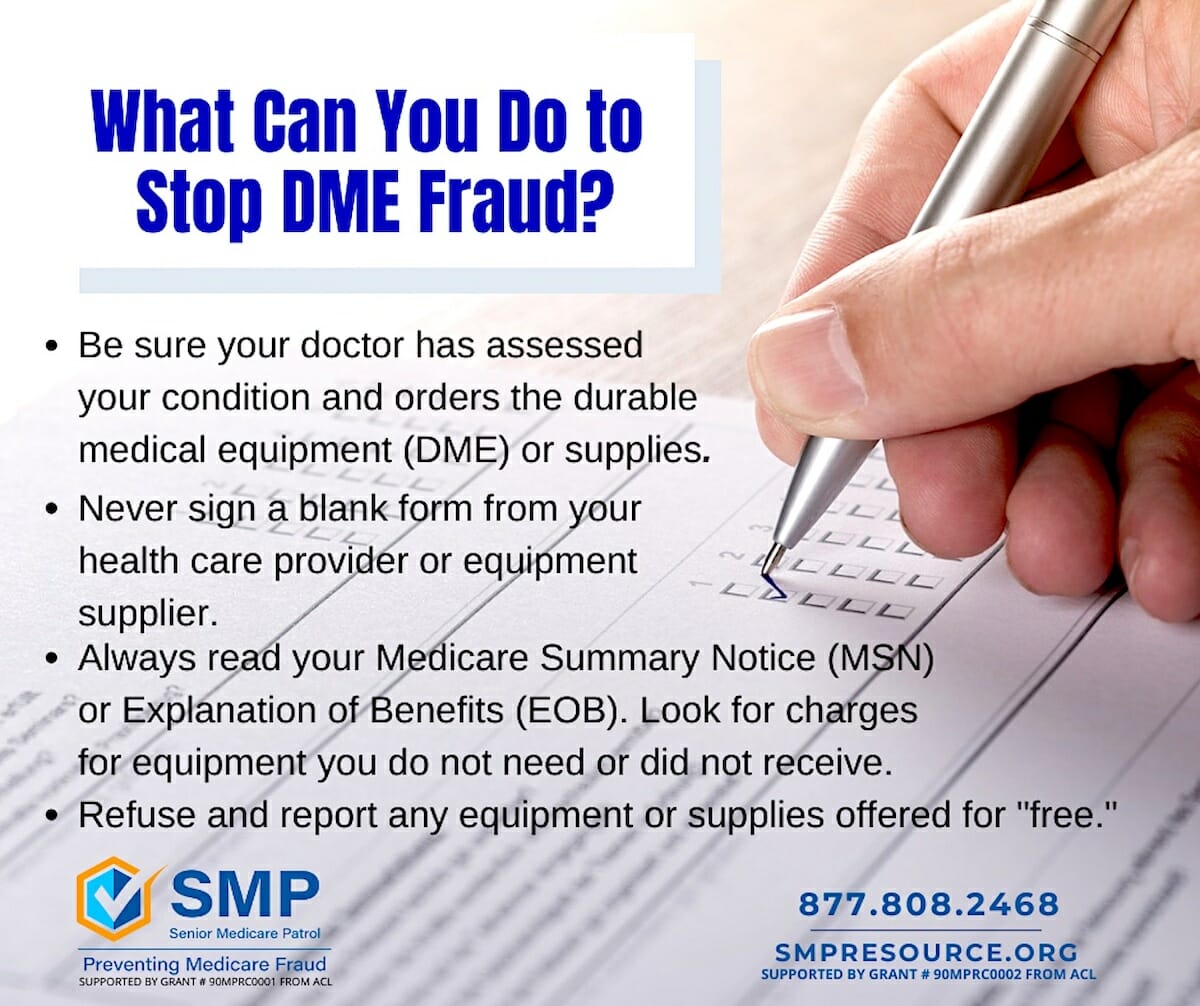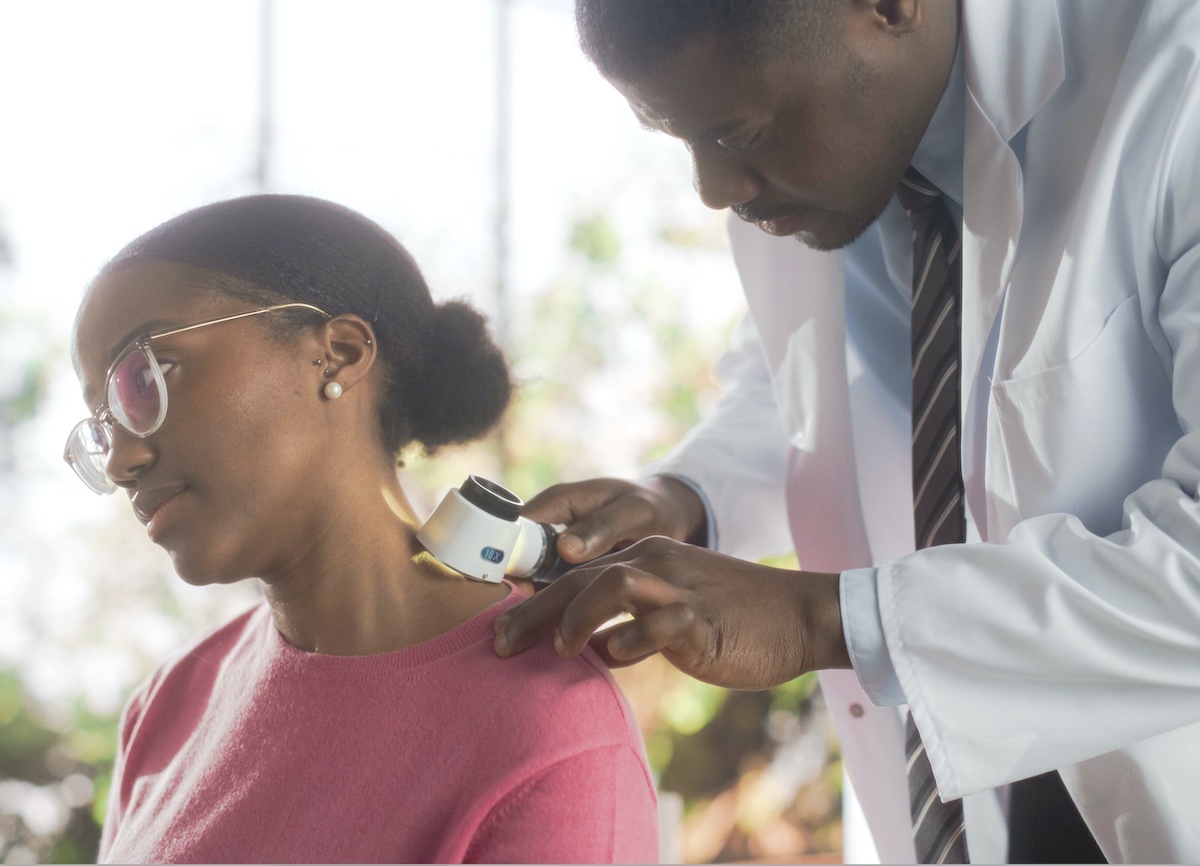Tips for protecting yourself and your Medicare
This is a time of year when thoughts turn to giving… just be careful you’re not getting taken. Especially if you’re an older health consumer. Care magazine® will be spotlighting several medical scams that even savvy seniors can fall for.
Scammers are offering Medicare beneficiaries tests and “free” durable medical equipment to obtain their Medicare information for fraudulent billing purposes, or possibility medical identity theft. In a medical equipment scam, someone reaches out to you with an offer of a “free” (as in, “Medicare will pay for it”) brace, wheelchair, or another device. You might get an unsolicited phone call, see an advertisement, or be approached at a health fair or similar event.
Durable medical equipment (DME) and orthotics companies offer a valuable service by providing wheelchairs, surgical supplies, catheters, and respiratory nebulizers as well as nutrition and tube feeding supplies and other health care equipment. DME and/or orthotics are considered medical equipment prescribed by your doctor that can withstand repeated use, serve a medical purpose, and can be used in the home. However, many fraudulent companies across the country are charging Medicare beneficiaries for this equipment without showing the medical necessity and sometimes without even sending the equipment to the beneficiaries.
Medicare Part B covers medically necessary durable medical equipment, or “DME,” that is prescribed by your doctor, can withstand repeated use, serves a medical purpose, and can be used in the home. Medicare only covers DME if you get it from a supplier enrolled in the Medicare program. Medicare Part B pays 80% of the approved amount and you pay the other 20%.
What does Medicare cover in relation to DME, Orthotics, and Prosthetics?
DME that Medicare covers includes, but is not limited, to:
- Blood sugar monitors and test strips, canes, continuous positive airway pressure (CPAP) devices, crutches, hospital beds, infusion pumps and supplies, oxygen equipment and accessories, patient lifts, walkers, wheelchairs, and scooters.
- Prefabricated orthotics that Medicare covers include, but are not limited, to shoulder, knee, back, wrist, and ankle braces.
- Prosthetic devices that Medicare covers include, but are not limited, to: Breast prostheses (including a surgical bra), one pair of conventional eyeglasses or contact lenses provided after a cataract operation, ostomy bags and certain related supplies, some surgically implanted prosthetic devices (including cochlear implants), and urological supplies.
Examples of Durable Medical Equipment Fraud Schemes
- Suppliers who offer “free” equipment but bill Medicare.
- Suppliers who want you to use their doctors (not yours), who then prescribe unnecessary medical equipment.
- Suppliers or doctors who provide medical equipment or supplies you never requested.
- Suppliers or doctors who charge for items you never received.
- Suppliers who bill for people who have passed away.
- Suppliers who request your Medicare number at a presentation, during a sales pitch, or in an unsolicited phone call.
- Beneficiaries who willingly allow their Medicare number to be used in exchange for money, gifts, or unnecessary equipment and supplies.
- Suppliers who deliver an off-the-shelf product but bill Medicare for a more costly product.
Warning Signs
- You receive an unsolicited call or other communication offering a free or low-cost medical device as a Medicare “benefit.”
- Someone claiming to be from Medicare asks for your Medicare or Social Security number. Medicare representatives almost never make unsolicited calls to consumers and do not ask for personal information by phone.
- Your quarterly Medicare Summary Notice (MSN) or an explanation of benefits (EOB) from your health plan lists medical equipment you did not order or receive.
What can you do to stop DME fraud?
- Be sure your doctor has assessed your condition and orders the equipment or supplies.
- Never sign a blank form from your health care provider or equipment supplier.
- Always read your Medicare Summary Notice (MSN) or Explanation of Benefits (EOB). Look for charges for equipment you do not need, never requested, or did not receive.
- If you rent and return medical equipment, always get a dated receipt.
- Protect your Medicare, Medicaid, and Social Security cards like credit cards.
- Do not accept products or services from strangers who call or knock on your door.
- Do not give out your Medicare number at a presentation, or during a sales pitch at any event.
- Do not accept money, gifts, or unnecessary equipment and supplies from a supplier in exchange for your Medicare number.
Example Medicare Charges for DME
Any Medicare code that starts with an “L” indicates that it is an orthotic, which is a type of DME. Here are some examples:
L0625-LO651: Lumbar Orthosis — Back brace
L1810-L1860: Knee Orthosis — Knee brace
L1900-L1990: Ankle-foot Orthosis — Ankle brace
L3650-L3678: Shoulder Orthosis — Shoulder brace
L3763-L3931: Wrist Orthosis — Wrist brace
Always read your Medicare Summary Notice (MSN) or Explanation of Benefits (EOB). Call Medicare (800-633-4227) or your insurance company if you see claims for supplies or services you don’t recognize.
Report your concerns about billing errors or possible fraud to Medicare and your local SMP (Senior Medical Patrol). In South Carolina, the Department on Aging/SMP can be reached at aging.sc.gov or call 1-800-868-9095.
You may also contact the fraud hotline at the U.S. Department of Health and Human Services’ Office of Inspector General (OIG). You can also contact the OIG by phone (800-447-8477) or email (spoof@oig.hhs.gov).
Sources: https://www.smpresource.org/Content/Medicare-Fraud/Fraud-Schemes/









